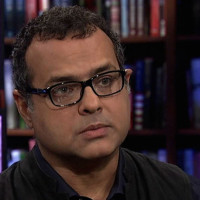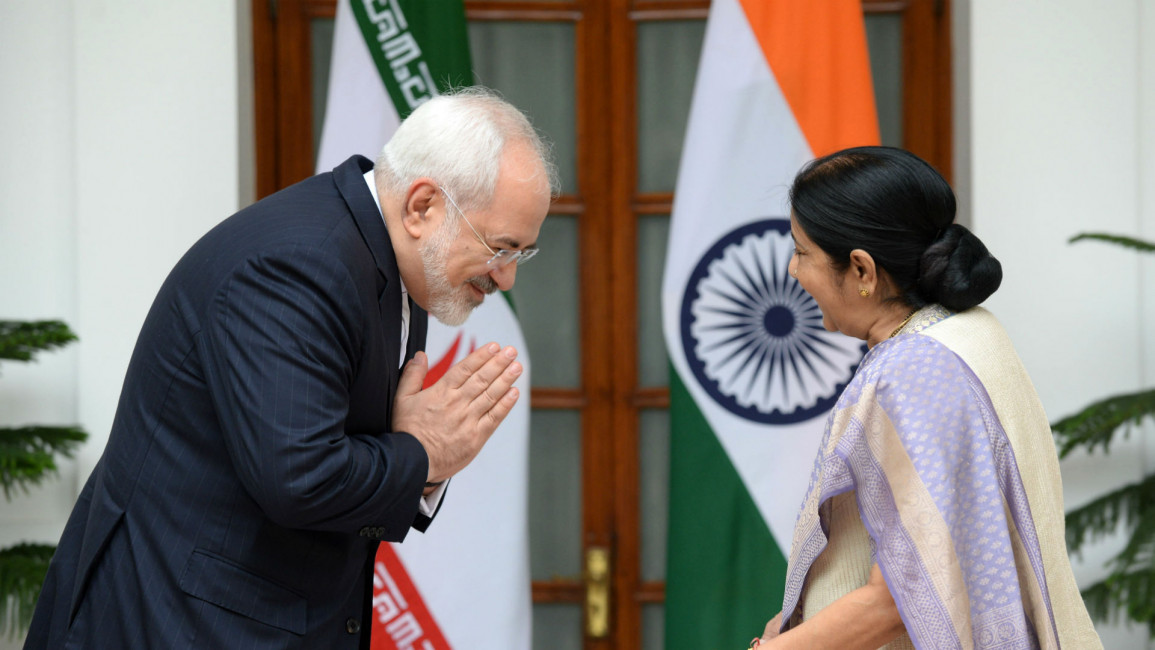
India, another winner in the Iranian nuclear deal
He went to India, Pakistan and Russia. On the table were major energy deals and infrastructure projects. India is an important player here - it is a major investor in Iran, for instance in the Chabahar port, and imports Iranian energy.
India also sits on payments that it owes Iran, but could not repatriate due to the blockade on Iran's financial system.
But India is not merely a commercial partner. It also plays a crucial role in the diplomatic sphere, notably in the Brics bloc and in the Non-Aligned Movement.
India's subordination to the West
Under immense US pressure in 2005, India voted twice against Iran in the International Atomic Energy Agency meetings.
US investment in India was not idle. As US ambassador David Mulford said to his superiors in the State Department at the time, "India had a key voice in the NAM and could swing opinion" in the IAEA.
It was generous of Zarif to say in New Delhi that "India has been a friend of Iran in difficult times, and we don't forget that".
India imports 80 per cent of its crude oil, which it gets from the Gulf, Iraq, West Africa and Venezuela.
Ten years ago, almost 20 per cent of India's oil imports came from Iran. Due to the sanctions regime, that number has fallen to six per cent. Part of the imported crude oil came to India to be refined and then re-exported.
In 2008-09, India exported $1 billion of such refined petroleum products to Iran. That figure has declined to almost nothing.
| It was generous of Zarif to say in New Delhi that 'India has been a friend of Iran in difficult times, and we don't forget that'. |
Oil supplies from Iran did not stop coming to India. Creative mechanisms to pay had to be found - including Turkey's Halkbank and then payment in rupees in India's UCO Bank.
This money in UCO Bank now amounts to $8.8 billion. It will have to be cleared in haste. Iran is eager to recover its assets.
In 2008, the Indian energy company - ONGC Videsh - discovered a major offshore gas field, Farzad B. Estimates suggest that the field contains 21.7 billion cubic feet of gas.
ONGC Videsh also found the Binaloud oil field off the Farsi offshore block - but it decided for various reasons not to exploit that find. It is now held by a private Iranian company.
Show me the money
The nuclear deal has now opened the door for ONGC Videsh to return to Farzad B - it has submitted a revised proposal to Iran for exploitation. The Iranian ambassador to India, Gholamreza Ansari, said that India gets "first priority" at Farzad B, although he has publicly expressed his frustration at India's slow pace.
Zarif's trip to Pakistan and India is significant. India is the main foreign investor in the Chabahar port, from where a road and rail network is almost complete to Kabul and then out to Central Asia and Russia.
This transport hub was intended to provide India with a backdoor entry into the Central Asian and Russian markets - subverting its need to ship products through Pakistan.
Across the Iran-Pakistan border, China has invested heavily in the Pakistani port at Gwadar. It has plans for roads running through Pakistan to Kabul. The Gwadar and Chabahar port are in one sense competitive, although in recent years, the Iranians have provided power for Gwadar from their eastern gas fields.
Equally important as an indicator of cooperation rather than competition is the idea of an Iran-Pakistan-India natural gas pipeline. It would run from Iran's eastern fields through Pakistan into India – one of the world's largest markets for energy.
It is not for nothing that this is called the 'peace pipeline', since it would link India and Pakistan to a project that would benefit both commercially and, as theory goes, reduce the possibility of war between the neighbours.
The pipeline would run through Pakistan's Balochistan, an area of great mineral wealth whose people have not shared in its spoils. A pipeline such as this would be best built upon a proper bargain with the people rather than through the lens of security.
Security threats and the peace pipeline
China has learned from its experience in Afghanistan's Mes Aynak copper mine that guns cannot protect an investment if there is a popular insurgency in the area. The people must be advantaged or else the investment is only good in the short run.
The 'peace pipeline' would require substantial Chinese investment. China has already pledged to finance the section that would run from Asaluyeh in Iran to Nawabshah in Pakistan.
| The 'peace pipeline' would require substantial Chinese investment. |
This is part of China's $46 billion investment in Pakistan. As a measure of its intent, China now has one of the largest embassies in Islamabad, dwarfing the giant US embassy. Whether the new financial tensions in China will undermine this strategy is to be seen.
Would the pipeline be extended to India? India left the project in 2009, largely because of US pressure. With the sanctions regime almost lifted, India might wish to return to the table. Iran is eager that this happens. For it to take place, however, a proper Asian Bargain would be necessary.
It would require diplomatic initiatives between China, India, Pakistan and Iran. The likelihood of such cooperation, given the frayed relations between the parties, is low.
Turbulence in the global financial sector has averted the world's eyes from these developments in Asia. At this time, the US remains the buyer of last resort.
It is an essential part of the satanic system that includes underpaid Chinese workers, exploited African and Latin American mines and fields, and Chinese surplus handed over to indebted shoppers in the West.
These new Asian commercial links circumvent the West. and appear to provide an alternative to the reliance upon western markets. The end of the sanctions regime in Iran is not merely about the sale of Iranian energy to Europe - it will end the isolation of Iran from its Asian partners.
It would allow India once more to step back from being a subordinate ally of the West to being a key voice in the Global South.
Vijay Prashad is a columnist at Frontline and a senior research fellow at AUB's Issam Fares Institute of Public Policy and International Affairs. His latest book is The Poorer Nations: A Possible History of the Global South (Verso, 2014 paperback).
Opinions expressed in this article remain those of the author and do not necessarily represent those of al-Araby al-Jadeed, its editorial board or staff.




